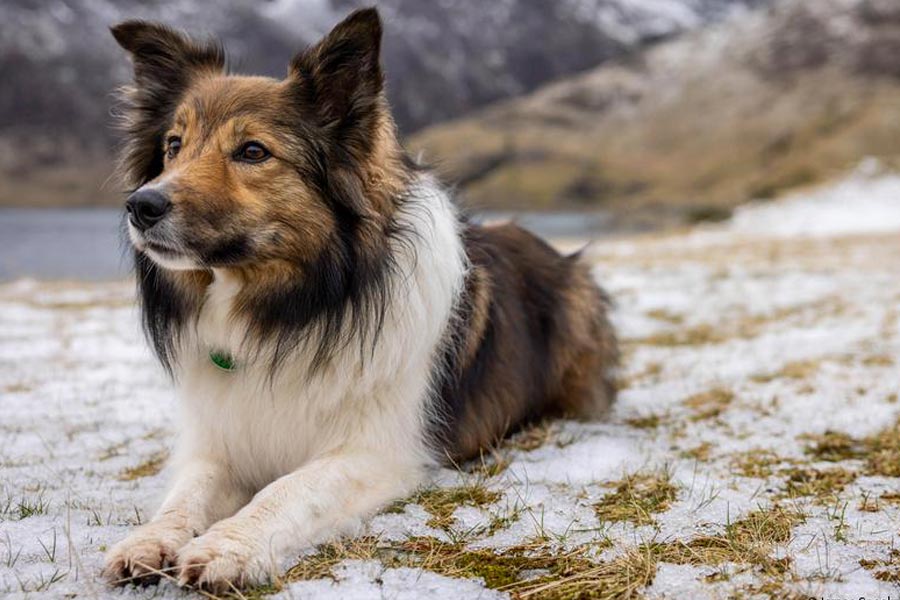Anna had been feeling sick for days. The young entrepreneur from the US state of Virginia didn't know what was wrong, and on top of the nausea and uncertainty, her dog was acting weird, too. Lulu, a poodle that was normally more attached to Anna than her husband, suddenly didn't want to be near Anna anymore.
Then Anna found out she was pregnant ― although "finding out" in this case involved massive bleeding and a visit to a hospital emergency room.
Anna was told that if the fetus survived, she would face a high-risk pregnancy.
She and her husband returned from the hospital in shock. It was the hardest day of her life. All she wanted when she got home was to lie down and cuddle with her dog. But Lulu refused.
Anna, who preferred to go by a pseudonym in this article to protect her privacy, told DW she was angry with her dog. She felt that Lulu had been ignoring her the entire time that she had felt sick.
"She wouldn't sleep next to me like she [had] almost every night since we got her," said Anna, looking back on the experience. "She only wanted to sleep next to my husband, which she [had] never done."
A couple of days later, the fetus died. Anna had never needed support more in her life, and still, Lulu would not go near her. Her dog's uncharacteristic behavior hit her hard. "I thought dogs were supposed to give you unconditional love," said Anna.
Dogs can smell a difference in human hormones
It took several days after Anna's dilatation and curettage surgery for Lulu's behavior to return to normal. Now she is "much more loving" and back to cuddling with Anna as she recovers.
But what made the animal's behavior change so drastically?
"Dogs can smell pheromones and with pregnancy or after a miscarriage, there's a change in their owner's scent," said dog coach Sissy Leonie Kreid, who studied animal sciences at Wageningen University in the Netherlands and founded "Akademie Hund" (dog academy) in Germany.
Kreid said such changes in a person's hormonal chemistry can affect a dog's behavior. But it's not the only explanation for what may have happened between Anna and Lulu.
"People also change their behavior after a miscarriage, they become sadder, maybe even desperate. The dog doesn't understand this change and needs time to get used it," said Kreid.
That is what Anna went through with her dog.
"I do feel bad that Lulu must have been very confused," Anna said. "Now, I mean. At the time I was just very angry."
Kreid said that a dog's behavior will likely to revert back to normal once the person's hormonal levels readjust after an event such as a miscarriage. Usually, the expert said, the dog will be his or her old self within a few weeks, sometimes only days, just as it was with Anna's poodle.
When your dog knows you're pregnant before you do
Dogs can find people lost in the woods or buried under earthquake rubble. They can also sniff out cancer or long COVID. And sometimes they can tell that their owner is pregnant very early on. That happened to Anna as well.
"[My dog] stopped wanting to be near me before I knew about the pregnancy," Anna said.
Based on her years of experience with hundreds of dogs and their human families, Kreid said that dogs notice when change is in the air.
"We don't have scientific data on whether dogs know what this change means, but from their behavior we can tell that they obviously know something is different," added Kreid.
From phantom pregnancy to guard-dog behavior
Benedict, a fitness coach from Bonn, Germany, said that family dog, Merle, definitely noticed when Benedict's wife was pregnant with their first child.
"Merle suddenly had this urge to nest," said Benedict. "She collected stuffed animals to build herself this comfy corner. It was like she had a phantom pregnancy."
Other behaviors dogs can display when their owners are pregnant include their becoming extremely attached to the pregnant person or becoming overprotective.
"A dog might become controlling and protective and not allow people they don't know to sit next to the pregnant person," said Kreid. "They might also bark aggressively at any noises coming in from the outside."
Kreid recommended getting an expert in dog behavior to help if that happens, because such behavior can intensify once the baby is born. Dogs can, for instance, experience jealousy, as a US study found in 2014.
"Empathy with the dog has to be the number one reaction," she said. "When a baby is on the way, it's an uncertain, confusing situation for a dog. It can be for humans, too ― but the dog has a lot less control over it, so it can get nervous or neurotic. It's important to show understanding."
Prepare your dog for your baby
If you're pregnant, it's good to prepare your dog for your baby as early as possible.
You can start by getting someone else in the household to feed your dog or take it for walks. That way it will be less of a change if you should become too tired to do those things yourself.
It's also good to get the dog used to baby sounds so that they "don't jump up or bark when you're carrying around a crying baby," said Kreid.
But Kreid said you shouldn't leave your baby or infant alone with your dog.










